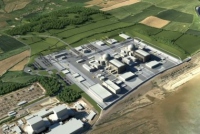The UK will not be able to meet its climate change targets without new nuclear but should develop a fall-back plan in case projects to build new capacity by 2025 do not proceed as planned, a parliamentary committee has concluded.
 |
| EDF Energy's vision for Hinkley Point C (Image: EDF Energy) |
With all but one of the UK's existing nuclear power plants due to retire by 2023, the cross-party Energy and Climate Change Committee's inquiry was prompted by concerns over potential barriers to new-build plans. The committee's newly released report - entitled Building New Nuclear: The Challenges Ahead - finds that unless planned nuclear power plants are built on time, it will be "extremely challenging, if not impossible" for the country to meet its legally binding long-term carbon reduction targets. A failure to build the currently planned 16 GWe of new nuclear capacity by 2025 would also force greater reliance on imported gas, affecting energy security.
The report found the upfront costs of constructing a new nuclear plant to be one of the largest challenges facing new build, followed by public attitudes and the potential for bottlenecks in the nuclear supply chain in a country that completed its last nuclear new build project nearly two decades ago.
The committee supported the government's 'contracts for difference' scheme to assist the financing of new nuclear capacity, while voicing concern over a perceived lack of transparency around ongoing price negotiations between government and industry. Such contracts must provide value for money for consumers, and prices should not be higher than other low-carbon energy sources, it said. At the very least, the report found, the nuclear 'strike price' - the price guaranteed to the generator under the scheme - should not be higher than that given to offshore wind, expected to be around £100/MWh ($151/MWh) by 2020.
Hopes and aspirations
Although the UK government is taking steps to facilitate and encourage nuclear new build, final decisions on whether or not to go ahead with nuclear projects will lie with the companies themselves. The committee expressed great concern that the government had no contingency plans in place should would-be reactor builders decide not to proceed. "Crossing one’s fingers is not an adequate or responsible approach when the UK’s legally binding climate change commitments and energy security are at stake," the report stated, adding that the UK Department of Energy and Climate Change (DECC) "appears to be overly reliant on aspiration and hope." While sharing the hope that new build would be delivered as planned, the committee recommended that DECC also must begin considering "contingency options as a matter of urgency".
In preparing its report, the committee received written and oral evidence from witnesses including the companies proposing to build the UK's new nuclear plants, as well as meeting local representatives and visiting the site of EDF's proposed Hinkley Point C plant. The committee said that communities hosting nuclear power stations should be given the same rights to benefits as the UK government wishes to extend to those hosting renewable energy installations, as nuclear power plants contribute to the same aims of meeting a national need for secure, clean energy.
As for public engagement, the report called for better coordination between nuclear and environmental regulators and developers and greater support for communities in interpreting and understanding the planning process for large infrastructure projects. Often the disruption caused by the construction of such projects is of as much, if not more, concern to local communities than nuclear risks, the report observed.
UK energy minister John Hayes welcomed the report and emphasised the government's determination to see new nuclear in the UK's future energy mix. ""We are working to make the UK one of the most attractive places in the world to invest in new nuclear," he said, promising transparency over the terms of any investment contracts offered to developers of low-carbon generation.
A statement from EDF Energy in response to the report emphasised recent progress towards its planned two-unit new build project at Hinkley Point C, for which a planning decision is expected soon. The company reiterated its support for the use of contracts for difference to make such projects possible.
Spokespersons from the UK's nuclear industry and engineering sectors added their voices to the debate triggered by the report's publication. Exhorting the UK to "get behind nuclear", Keith Parker, chief executive of the UK Nuclear Industry Association, pointed to nuclear's potential to help create long-term price stability and reduce dependence on imported fossil fuels. "No-one knows the future of gas prices," he pointed out. His words were echoed by Alistair Smith of the Institution of Mechanical Engineers, who also criticised governmental "dithering" on the issue of the strike price.
Researched and written
by World Nuclear News














